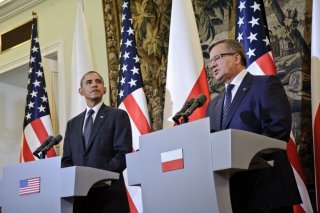Ukraine Can Take Inspiration from Poland’s Post-Soviet Transformation
A possible path forward for Ukraine?
It is fitting that President Obama’s first meeting with newly elected Ukrainian President Petro Poroshenko occurred today in Warsaw. The formal reason for Obama’s trip is to mark the 25th anniversary of Poland’s first post-communist election. Obama’s trip to Warsaw, the first stop in a three-country Europe swing, is intended to reassure Poland and other front-line states of the continuing credibility of Washington’s commitment to the defense of its NATO allies in the face of Russia’s annexation of Crimea and continued provocations in Ukraine’s East.
Russian actions have made it imperative that the United States and NATO take clear and tangible steps of reassurance. To date, these have included reinforced air policing over Baltic air space, “beefed up” ship movements in the Black Sea, and military exercises. The United States also dispatched F-16s in March to the U.S. Air Force Aviation Detachment in Poland for joint training.
Yesterday, President Obama proposed a package of $1 billion in additional defense reassurances, including possible prepositioning of military equipment in Europe and improvements to infrastructure. Obama also responded to requests by Ukraine for non-lethal military aid, with pledges to supply $5 million for body armor, night vision goggles and other materiel support. It is important that these proposals be funded and implemented and that other NATO states do their part so that President Putin does not underestimate NATO’s commitment to mutual defense.
Obama’s trip to Warsaw, his second as President, is also an opportunity to showcase the accomplishments of contemporary Poland, which have particular resonance now for Ukraine. Poland’s economic transformation may be the most successful of the third wave of democratization that began in the late 1980s. In 1989, Poland was an economic basket case, as was its neighbor to the east, Ukraine. At the time, Ukraine’s GDP was modestly higher than Poland’s. Today Poland, a country slightly smaller than Ukraine, has a GDP that is nearly three times larger. Poland is now the EU’s sixth largest economy and, depending on how you do your bookkeeping, among the world’s twenty largest economies.
Poland, of course, faces economic difficulties, including double-digit unemployment in parts of the country, and the need to expand the economic benefits of EU membership throughout the country, particularly in parts of the east and northwest. In addition, Poland needs to plan now for sustaining its economic growth before the well of EU “cohesion funds” -- EU financial support for innovation and infrastructure -- runs dry around the end of this decade. But notwithstanding its challenges, Poland’s success is testimony to the fact that governance matters; at Poland’s pivotal moment of transition its leaders acted boldly to build an economy based on the rule of law, and unleash the country’s economic potential. After 40 years of Soviet domination, the country was largely ready to accept these changes, despite the economic pain, and Poland still remains broadly committed to economic reform, an important factor in why Poland is the only EU economy to have avoided recession since 2008.
Poland’s leaders also worked to build a political system focused on the future, rather than dwelling on reprisals for past misdeeds. As the famous Solidarity journalist, Adam Michnik, has said, the Solidarity movement’s success was rooted in the fact that its “ideals are closer to the American revolution than the French.” Poles have not forgotten the misdeeds of the past but, for the most part, they have not been held back by them either; a signal accomplishment of a mature democracy, captured in the photo last week of Poland’s three living Presidents, despite some protests, participating in the funeral mass for Poland’s last communist leader, Wojciech Jaruzelski, of whom Poland’s famed democracy leader Lech Walesa said, “I won’t judge him. Let God and history do that.”
Poland has proven its ability to make difficult choices and pursue tough reforms in the interest of long-term growth and stability. Now it can be Ukraine’s turn. The challenges for Ukraine are very different. But Mr. Poroshenko, with the benefit of a strong electoral mandate and the backing of the United States and Europe, can be the first leader since Ukraine claimed its sovereignty to turn away from corruption and build a country that is more prosperous and stable and, as a consequence, less vulnerable to interference from its neighbor to the east.
Lee Feinstein served as President Obama’s first Ambassador to Poland and was also a former principal deputy director of Policy Planning at the Department of State. He presently serves as a senior fellow at the German Marshall Fund in Washington, DC.

